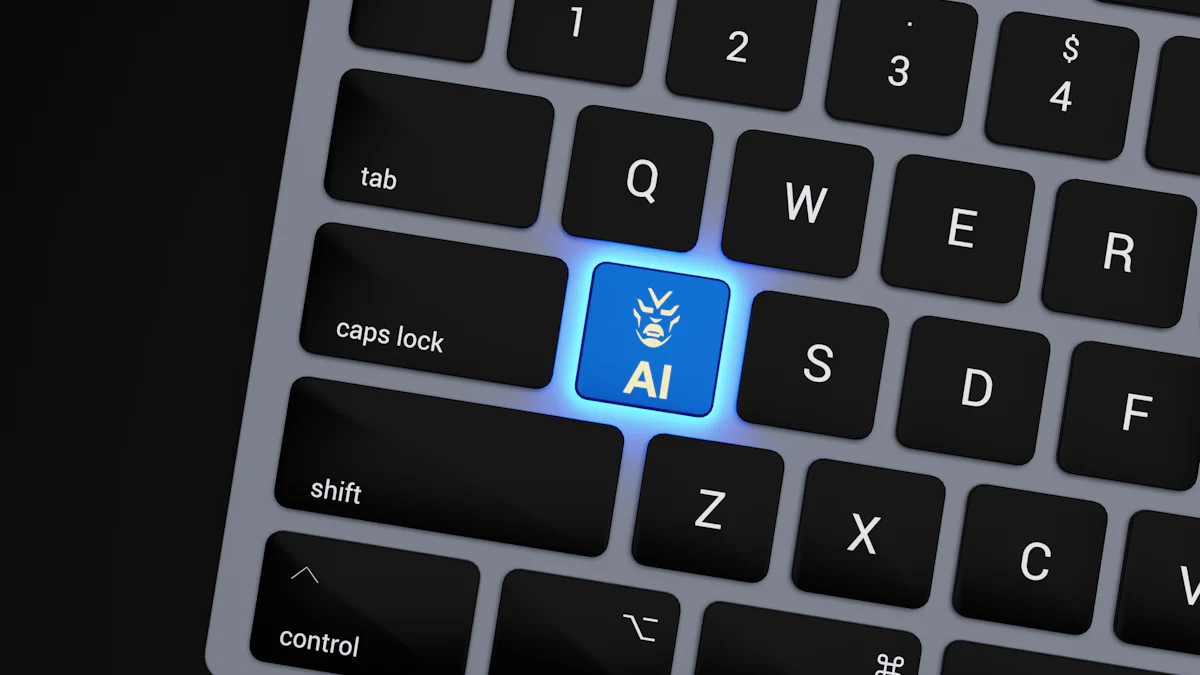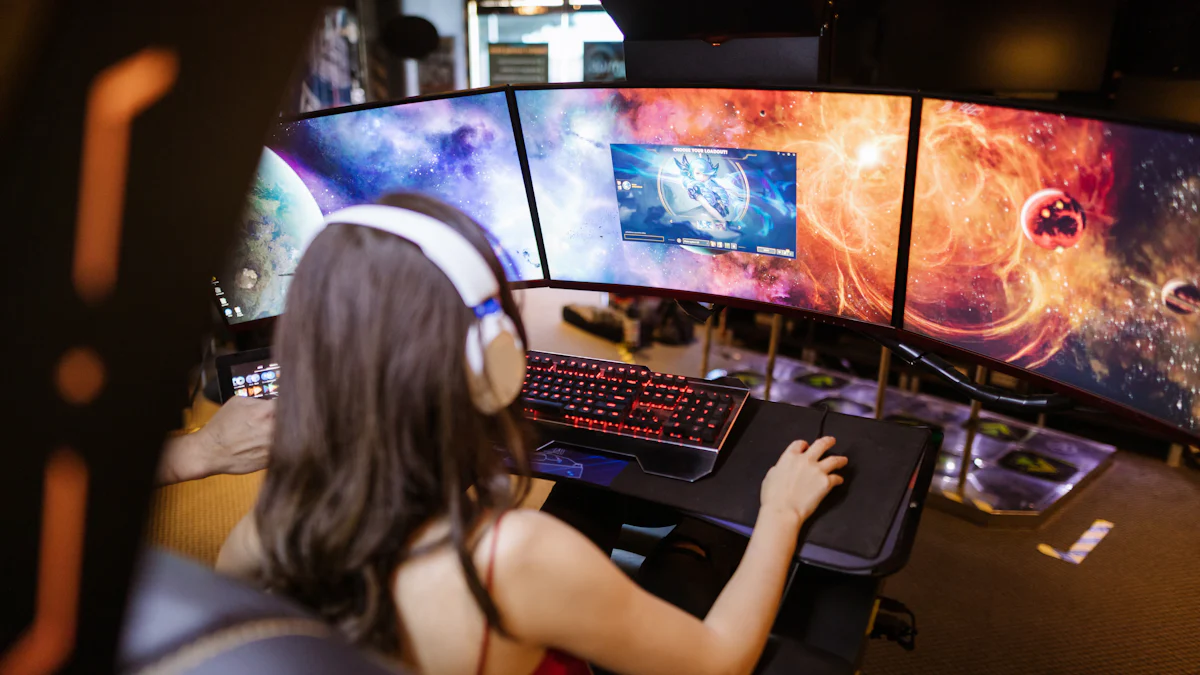Which Game AI Tools Are Best?

In the rapidly evolving world of game development, selecting the right Game AI tool can significantly impact a project's success. Developers have a plethora of options, including:
Ludo.ai
Unity ML-Agents Toolkit
Unreal Engine's AI Toolkit
NVIDIA DLSS
Charisma.ai
Scenario
Promethean AI
Latitude
Modl.ai
These tools offer diverse capabilities, from enhancing player engagement through behavior analysis to personalizing AI models based on user designs. By leveraging these technologies, developers can create more immersive and dynamic gaming experiences, ultimately transforming how players interact with games.
Criteria for Selection
Choosing the right Game AI tool involves evaluating several critical factors. Developers must consider how these tools align with their project needs and development goals. Here are the primary criteria to guide this selection process:
Ease of Use
Ease of use plays a pivotal role in determining the suitability of a Game AI tool. Developers often prefer tools that offer intuitive interfaces and straightforward functionalities. For instance, Unity ML-Agents stands out because it allows developers to train AI agents without requiring extensive coding knowledge. This feature makes it accessible to both novice and experienced developers. Similarly, Unreal Engine's Blueprints Visual Scripting provides a user-friendly approach to creating complex game mechanics, enabling developers to focus more on creativity rather than technical complexities.
Integration Capabilities
Integration capabilities determine how well a Game AI tool can work with existing systems and technologies. A tool that seamlessly integrates with popular game engines or platforms can significantly streamline the development process. Unity ML-Agents excels in this area by allowing developers to incorporate machine learning into Unity games, facilitating the creation of intelligent agents that learn from player behavior. This integration enhances the game's adaptability and responsiveness, providing a more immersive experience for players.
Performance
Performance is a crucial factor when selecting a Game AI tool. Developers need tools that can handle complex computations and deliver high-quality results without compromising speed or efficiency. Unreal Engine is renowned for its ability to produce high-quality graphics and complex game mechanics, making it a preferred choice for developers aiming to create visually stunning and dynamic games. The performance of a Game AI tool directly impacts the overall gaming experience, influencing player engagement and satisfaction.
Top Game AI Tools Overview

Ludo.ai
Features
Ludo.ai stands out as a versatile tool in the realm of Game AI. It leverages artificial intelligence to streamline various game development processes. This tool offers AI-driven game generators that assist developers in creating new characters, mechanics, and stories with remarkable efficiency.
Benefits
The primary benefit of using Ludo.ai lies in its ability to enhance creativity and speed up the development cycle. By automating repetitive tasks, it allows developers to focus more on innovation and less on mundane activities. This results in a more engaging gamer experience, as developers can dedicate more time to refining gameplay elements.
Use Cases
Ludo.ai finds its application in projects where rapid prototyping and idea generation are crucial. Indie developers and small studios often use this tool to quickly expand their game concepts and bring fresh ideas to life without extensive resources.
Unity ML-Agents Toolkit
Features
The Unity ML-Agents Toolkit integrates machine learning into Unity games, enabling the creation of intelligent agents. These agents learn from player behavior, allowing developers to craft realistic game scenarios. The toolkit provides a seamless connection with the Unity game engine, facilitating the training of AI agents to navigate, interact, and make decisions within virtual environments.
Benefits
Developers benefit from the Unity ML-Agents Toolkit by gaining the ability to create adaptive and responsive game environments. This toolkit enhances the game's adaptability, making it more immersive for players. It also reduces the need for extensive coding knowledge, making it accessible to a broader range of developers.
Use Cases
The Unity ML-Agents Toolkit is ideal for projects that require dynamic and interactive gameplay. Developers use it to create games where AI agents must adapt to player actions, providing a personalized gaming experience. This toolkit is particularly popular among developers aiming to incorporate machine learning into their game design.
Unreal Engine's AI Toolkit
Features
Unreal Engine's AI Toolkit offers a comprehensive set of tools for creating complex AI behaviors and interactions within games. It includes features like behavior trees, perception systems, and environment queries, which allow developers to design sophisticated AI systems.
Benefits
The toolkit's strength lies in its ability to produce high-quality graphics and complex game mechanics. Developers can create visually stunning and dynamic games, enhancing player engagement and satisfaction. The toolkit's robust performance ensures that games run smoothly, even with intricate AI systems in place.
Use Cases
Unreal Engine's AI Toolkit is widely used in projects that demand high-quality visuals and intricate AI interactions. Large studios often employ this toolkit to develop AAA titles, where the complexity of AI behaviors plays a crucial role in the overall gaming experience.
NVIDIA DLSS
Features
NVIDIA DLSS (Deep Learning Super Sampling) revolutionizes gaming graphics by leveraging AI-powered technology. It enhances visual fidelity and performance, allowing games to run at higher resolutions without sacrificing frame rates. This tool uses deep learning algorithms to upscale lower-resolution images, providing players with crisp and detailed visuals.
Benefits
The primary advantage of NVIDIA DLSS lies in its ability to deliver superior graphics quality while maintaining optimal performance. Gamers experience smoother gameplay with reduced latency, even on less powerful hardware. This technology extends the lifespan of gaming systems by enabling them to handle demanding titles without requiring frequent upgrades.
Use Cases
NVIDIA DLSS is ideal for developers aiming to create visually stunning games that perform well across various hardware configurations. It is particularly beneficial for AAA titles where high-resolution graphics are crucial for player immersion. Developers use this tool to enhance the visual appeal of their games, ensuring that players enjoy a seamless and engaging experience.
Charisma.ai
Features
Charisma.ai empowers game developers to craft engaging narratives and character interactions using AI. This tool provides a platform for creating dynamic dialogues and storylines that adapt to player choices, enhancing the storytelling aspect of games. It offers intuitive interfaces for designing complex narrative structures without extensive coding.
Benefits
The use of Charisma.ai enriches the gaming experience by making narratives more interactive and personalized. Players encounter unique story paths based on their decisions, increasing replayability and engagement. Developers benefit from streamlined narrative design processes, allowing them to focus on creativity rather than technical challenges.
Use Cases
Charisma.ai is perfect for games that prioritize storytelling and character development. Indie developers and narrative-driven studios often utilize this tool to create immersive worlds where player choices significantly impact the storyline. It is particularly effective in role-playing games and interactive fiction, where narrative depth is essential.
Scenario
Features
Scenario offers a comprehensive suite of AI-powered tools for game art creation. It streamlines the design process by automating repetitive tasks, allowing artists to focus on creativity. This tool provides features for generating textures, models, and environments, enhancing the efficiency of game art production.
Benefits
The main benefit of using Scenario is the significant reduction in time and effort required for game art creation. Artists can produce high-quality assets quickly, accelerating the development cycle. This tool also fosters innovation by freeing artists from mundane tasks, enabling them to explore new artistic directions.
Use Cases
Scenario is widely used in projects where rapid art production is crucial. Game studios, both large and small, leverage this tool to meet tight deadlines without compromising on quality. It is particularly useful in mobile and indie game development, where resource constraints often necessitate efficient workflows.
Promethean AI
Features
Promethean AI revolutionizes the creation of 3D assets and environments in game development. It leverages artificial intelligence to automate the generation of complex scenes, reducing the time and effort required from developers. This tool provides a robust platform for designing intricate game worlds with minimal manual input.
Benefits
The primary advantage of Promethean AI lies in its ability to enhance creativity while streamlining the development process. By automating repetitive tasks, it allows developers to focus on innovation and design. This results in richer and more immersive game environments, as developers can dedicate more time to refining the artistic elements of their projects.
Use Cases
Promethean AI is ideal for projects that require detailed and expansive game worlds. Large studios often use this tool to create AAA titles where the complexity of the environment plays a crucial role in the gaming experience. It is also beneficial for indie developers who need to produce high-quality assets without extensive resources.
Latitude
Features
Latitude offers a dynamic platform for creating interactive game worlds. It automates various design tasks, allowing developers to focus on crafting engaging gameplay experiences. This tool provides features for generating dynamic environments that respond to player actions, enhancing the interactivity of games.
Benefits
The use of Latitude significantly reduces the workload on developers by automating mundane design tasks. This enables them to concentrate on creativity and innovation, resulting in more engaging and responsive game worlds. The tool's ability to create dynamic environments enhances player immersion and satisfaction.
Use Cases
Latitude is widely used in projects that prioritize interactivity and player engagement. Indie developers and small studios often leverage this tool to create games with dynamic worlds that adapt to player choices. It is particularly effective in open-world and sandbox games, where environmental interaction is key to the gaming experience.
Modl.ai
Features
Modl.ai provides a comprehensive suite of AI solutions for enhancing gameplay experiences. It focuses on creating intelligent systems that adapt to player behavior, offering tools for behavior analysis and personalization. This tool enables developers to craft unique and engaging gameplay scenarios.
Benefits
The main benefit of using Modl.ai is its ability to personalize the gaming experience. By analyzing player behavior, it allows developers to tailor game mechanics and scenarios to individual preferences. This results in a more engaging and satisfying experience for players, as the game adapts to their unique playstyle.
Use Cases
Modl.ai is ideal for projects that require personalized gameplay experiences. Developers use this tool to create games where AI systems adapt to player actions, providing a tailored experience. It is particularly popular in genres like role-playing and strategy games, where player choices significantly impact the game world.
Comparison of Game AI Tools

Strengths and Weaknesses
When evaluating Game AI tools, understanding their strengths and weaknesses is crucial for developers. Each tool offers unique capabilities that cater to different aspects of game development.
Ludo.ai: This tool excels in rapid prototyping and idea generation. It automates the creation of characters and stories, which speeds up the development process. However, it may not offer the depth needed for complex AI behaviors.
Unity ML-Agents Toolkit: Known for its ease of use, this toolkit integrates seamlessly with Unity, allowing developers to create intelligent agents without extensive coding. Its limitation lies in its dependency on the Unity engine, which might not suit projects using other platforms.
Unreal Engine's AI Toolkit: This toolkit provides robust tools for creating complex AI behaviors and high-quality graphics. Its complexity can be a drawback for developers unfamiliar with Unreal Engine's intricacies.
NVIDIA DLSS: This technology enhances graphics and performance, making it ideal for visually demanding games. However, its reliance on specific hardware may limit its accessibility for some developers.
Charisma.ai: This tool shines in crafting engaging narratives and lifelike character interactions. It supports various platforms, including VR and education. Its focus on storytelling might not suit projects prioritizing gameplay mechanics over narrative depth.
Scenario: It streamlines game art creation by automating repetitive tasks, which boosts efficiency. However, it may not provide the customization needed for highly unique art styles.
Promethean AI: This tool automates the generation of 3D assets, enhancing creativity and reducing development time. Its automation might not suit projects requiring highly detailed manual input.
Latitude: Known for creating dynamic game worlds, it automates design tasks to enhance interactivity. Its focus on automation might not align with projects needing precise control over every design element.
Modl.ai: This tool personalizes gameplay experiences by adapting to player behavior. Its strength lies in behavior analysis, but it might not offer the same level of graphical enhancement as other tools.
Best Use Scenarios
Identifying the best use scenarios for each Game AI tool helps developers choose the right one for their projects.
Ludo.ai is perfect for indie developers and small studios needing rapid prototyping and idea expansion.
Unity ML-Agents Toolkit suits projects within the Unity ecosystem, especially those requiring adaptive AI agents.
Unreal Engine's AI Toolkit is ideal for large studios developing AAA titles with complex AI interactions.
NVIDIA DLSS benefits developers aiming for high-resolution graphics in visually demanding games.
Charisma.ai fits narrative-driven games where storytelling and character development are paramount.
Scenario is beneficial for studios needing efficient game art production, particularly in mobile and indie games.
Promethean AI serves projects requiring expansive and detailed game worlds, often seen in AAA titles.
Latitude is suitable for open-world and sandbox games focusing on dynamic environments.
Modl.ai is best for games needing personalized gameplay experiences, such as role-playing and strategy games.
User Recommendations
Indie Developers
Indie developers often operate with limited resources and smaller teams, making efficiency and creativity crucial. Ludo.ai and Charisma.ai stand out as excellent choices for these developers. Ludo.ai aids in rapid prototyping and idea generation, allowing indie teams to quickly expand their game concepts without extensive resources. Its AI-driven game generators streamline the creation of new characters and stories, enabling developers to focus on refining gameplay elements.
Charisma.ai enhances storytelling by crafting engaging narratives and character interactions. Indie developers can use this tool to create immersive worlds where player choices significantly impact the storyline. This approach increases replayability and player engagement, essential for indie games aiming to stand out in a competitive market.
Promethean AI also offers valuable support by automating the generation of 3D assets and environments. This tool reduces the time and effort required from developers, allowing them to focus on innovation and design. Indie developers benefit from its accessibility, as it caters to both beginners and professionals, streamlining game development processes.
Large Studios
Large studios often tackle complex projects that demand high-quality visuals and intricate AI interactions. Unreal Engine's AI Toolkit and NVIDIA DLSS are ideal for these scenarios. Unreal Engine's AI Toolkit provides robust tools for creating sophisticated AI behaviors and high-quality graphics. Large studios can leverage this toolkit to develop AAA titles where the complexity of AI behaviors plays a crucial role in the overall gaming experience.
NVIDIA DLSS enhances gaming graphics and performance, making it perfect for visually demanding games. This technology allows games to run at higher resolutions without sacrificing frame rates, ensuring that players enjoy a seamless and engaging experience. Large studios benefit from its ability to deliver superior graphics quality while maintaining optimal performance.
Latitude offers a dynamic platform for creating interactive game worlds, automating various design tasks. Large studios can use this tool to craft engaging gameplay experiences with dynamic environments that respond to player actions. This approach enhances player immersion and satisfaction, crucial for open-world and sandbox games.
Modl.ai provides AI solutions for enhancing gameplay experiences through intelligent systems. Large studios can use this tool to create games where AI systems adapt to player actions, providing a tailored experience. This personalization enhances player engagement, making it a valuable asset for role-playing and strategy games.
The exploration of Game AI tools reveals their transformative impact on game development. Each tool offers unique strengths, catering to diverse needs. Developers can enhance creativity, streamline processes, and create immersive experiences. Tools like Ludo.ai and Unity ML-Agents Toolkit excel in rapid prototyping and intelligent agent creation. Meanwhile, Unreal Engine's AI Toolkit and NVIDIA DLSS provide robust solutions for high-quality graphics and complex AI behaviors. Developers should assess their specific project requirements to select the most suitable tool, ensuring a successful and engaging gaming experience.
See Also
Leading Figures Shaping the Global Intelligent Control Sector
Discovering Zhongkai: Unexpected Advantages for Mobile Manufacturing
Investigating iFlight's Influence Within the High-Tech Area
Zhongkai High tech Zone National foreign trade transformation and Upgradi Base(Electronic Information)Cloud Platform.
Address: Zhongkai High-tech Zone,Huizhou City ,Guangdong,China
E-mail: huizhoueii@163.com 13510001271@163.com
Tel: +86-0752-3279220 Mobile: +86-13510001271


